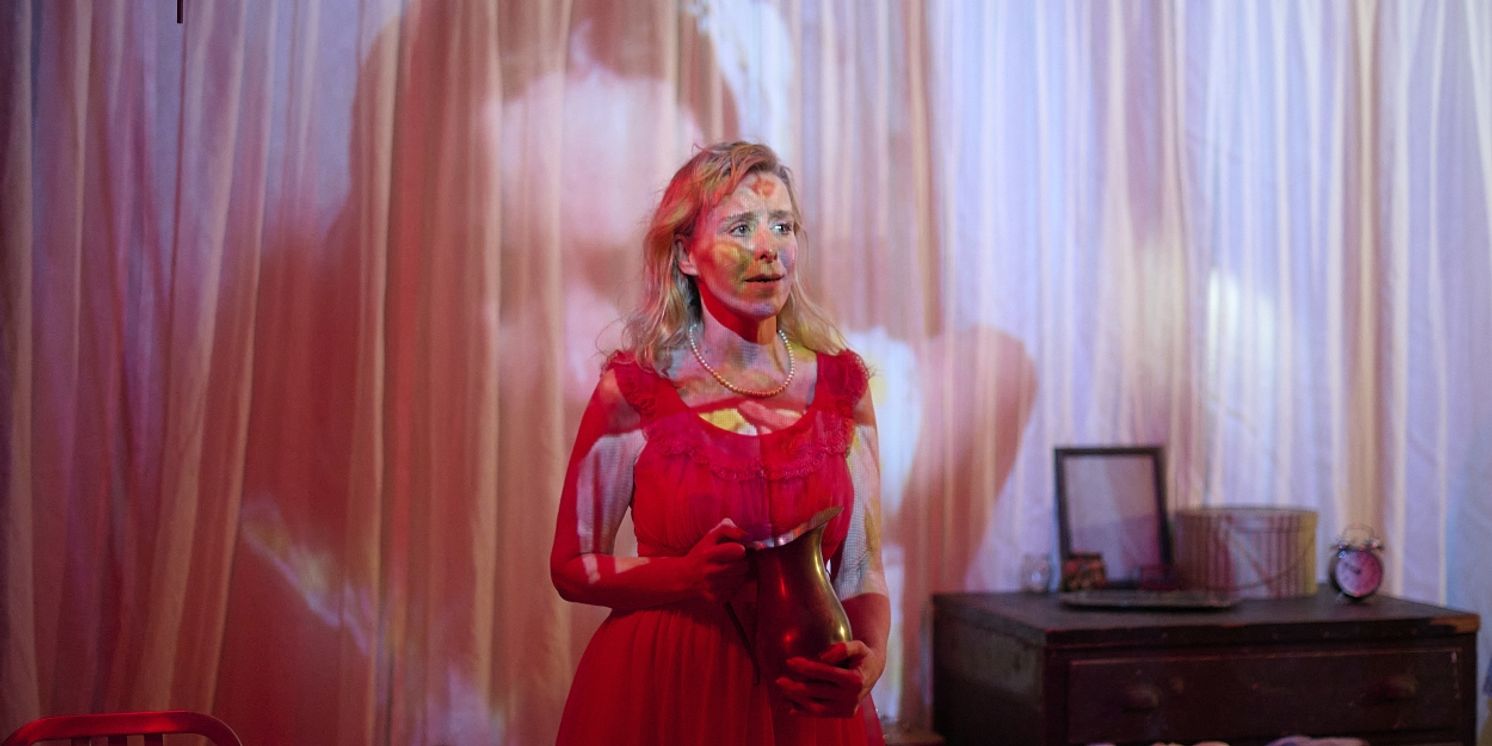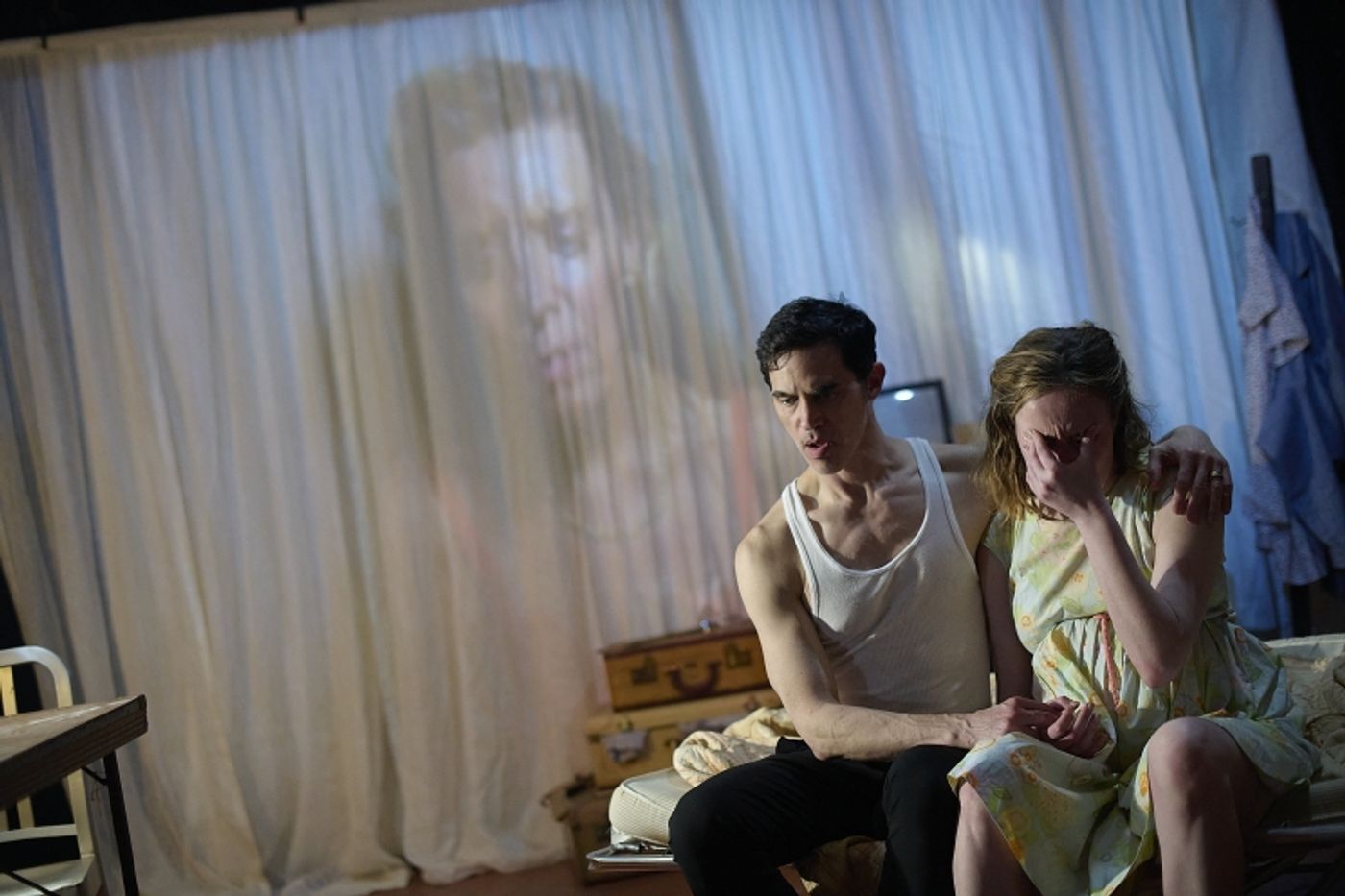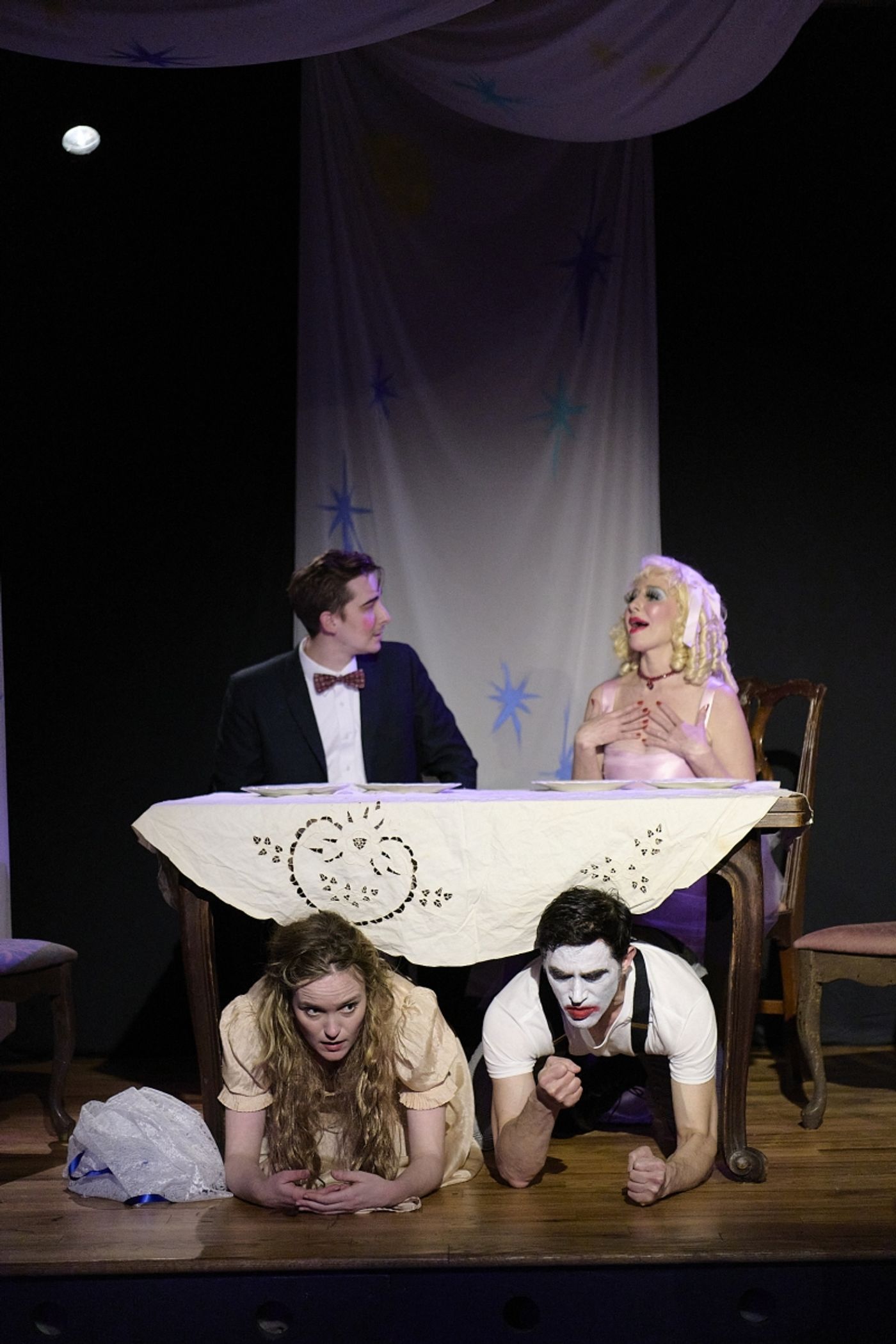Interview: Jaclyn Bethany of The Fire Weeds with OUTRAGED HEARTS
OUTRAGED HEARTS running through March 30th.


Exciting news is happening in New Orleans for Tennessee Williams enthusiasts. The Fire Weeds, a new female-focused, grassroots theatre company, is currently running their debut production OUTRAGED HEARTS: THE PRETTY TRAP and INTERIOR: PANIC in association with the Tennessee Williams & New Orleans Literary Festival. Running through March 30th, OUTRAGED HEARTS features two early Williams one-act plays. Under the artistic direction of Jaclyn Bethany and Lin Gathright, these productions provide audiences with a unique interpretation of Williams’s work.
THE PRETTY TRAP is an early incarnation of THE GLASS MENAGERIE, offering a fresh perspective on iconic characters like Amanda and Laura, while INTERIOR: PANIC is a lesser-known draft shedding light on Blanche’s psyche in an exploration of desire and trauma.
Bethany sat down with BroadwayWorld.com to share insights into the inspiration behind the selection of these two plays, the company’s commitment to staying true to Williams’ original vision and the innovative approach taken to stage these one-act plays while amplifying female voices.
BroadwayWorld.com: Can you tell me more about the inspiration behind presenting these two early Tennessee Williams’ one-act plays as your debut production?
Bethany: As a native of Mississippi, I have been enthralled by the work of Williams since I first discovered it in high school. I am particularly drawn to the way he explored women in his work. Beyond his most famous works, thousands of papers, early drafts, letters, journals, etc., have recently been discovered and are still being discovered. The Pretty Trap and Interior: Panic belong to this more recent canon. Seeing these iconic women - Amanda and Laura (The Pretty Trap later became The Glass Menagerie, Interior: Panic Streetcar) in these early forms is singular and enlightening. Lin and I were both interested in exploring these characters boldly and throwing out any preconceived notions about these characters and plays aside. Williams is also synonymous with New Orleans; we are performing on Desire Street, which feels very special.
BWW: How do you think these early drafts shed light on the themes and motifs in Williams’ later, more well-known plays?

Bethany: In The Pretty Trap, the characters’ names are the same. Laura can be interpreted as a shy, fragile wallflower from this draft - but that is not what we are doing here. The humor and bizarreness are on the page, especially with Amanda, and the comedy has to be there for the darkness to work. The Gentleman Caller comes, but the ending is very different, and the whole thing is billed as a comedy. The Glass Menagerie is undoubtedly devastating, so he shifted gears during his writing process. During the time he wrote and drafted Menagerie, his sister, Rose, received a full-frontal lobotomy. This certainly affected the ending of what became Menagerie. Interior: Panic is less developed on the page. There is not a beginning and an end. However, this draft clearly shows Blanche’s POV and focuses on the sisters. We are never really without her gaze on stage, literally. There is a camera with her in the bathroom, projected behind the action and right in the audience’s faces. The character that later became Stanley (Jack here) is on stage for just a few pages and is not a brute or any shade of Brando. This draft is much more experimental, almost like a horror play - but mixes Blanche’s poetry with a traumatic psychological experience played out on stage. We don’t see Blanche fully breakdown until the end of Streetcar. In this draft, she is hallucinating on every other page. It feels real and scary, and you understand her more and why she is the way she is. Both The Pretty Trap and Interior: Panic is very much about sex and female desire and longing in very different ways - these motifs indeed carry over in the later drafts of the plays but often are overshadowed by safe staging choices.
BWW: How did you approach adapting and staging these early drafts to create an immersive experience for audiences?
Bethany: I’ve been fortunate to see many Williams productions worldwide. I haven’t seen anything done quite like this regarding this work. When doing these classic works, you must make brave and bold choices. Theatre, especially commercial theatre, has become so celebrity or star-driven that it becomes less and less about the play, the art or any deeper artistic meaning. You will often see Williams in staunchly traditional or off-kilter productions, where unmotivated, risky choices are made but not thoroughly thought out. I fought to push both these pieces in extreme directions but always with the text and the history of these characters and Williams in mind. The crossover between them is that they are early drafts of such iconic pieces but are wildly different emotional experiences and stagings. One is camp; one is horror. They are both poetic, and they are both about women on the verge.

With The Pretty Trap, I was interested in seeing the childlike play between Tom and Laura because Rose and Tennessee were very close, and this relationship is often missing in interpretations of Menagerie. We also wanted to invite the audience into their house from the moment they arrived. Laura’s room is a part of the set/experience, and you feel Amanda’s magic and power in the house from the moment you step in. Tom is not the narrator yet; he lives as a poet and dreamer in Amanda and Laura’s world. Interior: Panic is a wild energy and emotional shift; it’s entirely naturalistic and HAS to feel lived in. The preshow for that is inviting the audience to observe Jack and Grace’s daily routine in their shotgun house without the omnipresence Blanche felt. When the play starts, it is clear it is Blanche’s story. We are staging this in a different room in the space, and the audience moves. There is a camera on Blanche when she is in the bathroom; the sound design is entirely immersive and the room is dingy and dark... It is very cinematic. The piece is only 20 minutes, and we have staged it so you cannot look away.
BWW: How do you balance staying true to Tennessee Williams’ original vision while incorporating your creative interpretations and innovations into the performances?
Bethany: I was interested in pushing The Pretty Trap towards the original production of The Glass Menagerie, which was entirely magical and rooted in Laurette Taylor’s mysticism and enigmatic, unpredictable Amanda. Lin is accidentally channeling Laurette, even wardrobe-wise. We are going back to the beginnings of these plays. In The Pretty Trap, Laura has no disability. It is never mentioned. Here, I was influenced by physical theatre and the avant-garde. Williams loved the theatre of the absurd. Laura is clearly very sheltered, and her only female example is her mother, so she has no barometer or idea of what is considered “normal” behavior-wise. It’s either zero or a hundred, so by the time the gentleman caller arrives, her sexually frenzied self has no choice but to come out to play. I used words that were used to describe Rose to mold my performance; she was often described as sex-crazed and imbalanced. She was fully alive, almost too much so that this is what alarmed her family. I am interested in smashing broad associations with female characterization tropes - such as words like fragility, innocence, ingenue, etc. I also loved Emma Stone’s performance in Poor Things this year; it was so powerful and bold. There is a little of Bella Baxter in Laura, but a lot of me, an homage to Rose, so many things.
We are looking at various aspects of womanhood and girlhood in both plays - and how they affect the female psyche; dramaturgically and through text, the women are at the center of these early drafts. We heightened this and built the world about them. You can be a woman of any age or a human and relate to the experiences explored in both pieces. We have the first pangs of sexual desire, loss of innocence, birth, death and the loss of youth and beauty. Some of this is gently mentioned in the text, but we heightened it. We made the Bill Collector in Interior: Panic a young woman, though the character is written initially as a man because, in this version of the play, there is no component of sexual tension between the Bill Collector and Blanche; the conversation is entirely between Grace and the Bill Collector, mostly imagined in Blanche’s mind.
It felt more threatening to me that the Bill Collector was a young girl. The thought of youth and innocence is constantly being shaken in front of Blanche’s face, both by her pregnant younger sister Grace and this young girl. At this stage in her life, Blanche cannot hold on to her youth and likely cannot have a child; this contributes to her fading grip on reality. However, we changed or interpreted the ending to end on the two sisters. I don’t want to give away, but it happens in our interpretation. But the play, or draft, ends when George (who later) became Mitch, shows up to apologize to Blanche with flowers. It feels much more potent for Blanche to try to regain her power to live through her sister and not an undeveloped male character. It was clear Tennessee was grappling with this ending and with the male characters; this is why these early texts are so beautiful; there is vast room to explore, and no clearcut story beat appears in the final plays. Someone mentioned that this was how Tennessee would have wanted his work to be staged, which is, to me, the highest compliment. You have to let go and find the magic.

BWW: What can audiences expect from attending this production? What do you hope they take away from the experience?
Bethany: The whole experience is different and unique. It’s different from anything I have been a part of before. It represents what our company is trying to say and achieve by putting women’s psyches at the center. We see these characters in a way that has not been done before. Our production engages with the audience in an immersive way through performance, multimedia and sound. I hope audiences walk away asking questions and feel moved, excited for the future but haunted by the beauty of Tennessee’s world.
BWW: Can you share any memorable anecdotes from the rehearsal and production?
Bethany: Our rehearsal process was incredibly intense. Due to scheduling, I am in between two movies, and we had a two-week rehearsal process. Even though these are one acts, they are strikingly different and full productions, so the rehearsal process feels like a blur. I constantly pushed boundaries and wild ideas to the center of the creative conversation. I am proud that I did that. My collaborators trusted me because taking risks keeps me engaged as an artist. Ross (who plays the early version of Stanley) got runner-up at the Stella shouting contest, which was fun. It’s remarkable to be doing this project in New Orleans, and it looks like it will live on both here and beyond, so we are just getting our feet wet discovering these characters and this world.
BWW: How did you envision the legacy of Tennessee Williams’ work evolving through a female lens? How do you hope these reinterpretations contribute to the broader cultural conversation surrounding his legacy?
Bethany: I am interested in eugenics and what that means surrounding A Streetcar Named Desire. In very early drafts, the relationship between Stanley and Blanche was consensual. There is more here, but I need the help of sources to go into it. Also, in Interior: Panic, Grace’s pregnancy is mentioned a few times, but it is unclear how advanced it is; when Interior: Panic starts in the context of Streetcar, it seems like later in the play, so we had to interpret and make a choice. The sexual tension with Jack, who later became Stanley, is one-sided with Blanche. He isn’t threatening her in any way other than having a baby with her sister, which is taking Grace away from Blanche even more. She is in his house, threatening him more than he is her.
All of this is genuinely rooted in a female experience. Both “houses” are dominated by female characters - The Pretty Trap is clearly Amanda’s house, and we took her description of “witch” to have a real meaning. And Laura is not the Laura you are expecting if you know Menagerie. But we are certainly not makingfun of these women; we are making them strong and brave; that is a fine line that a male director’s hands might be pushed in the wrong direction. We fought to make every choice intentional and intelligent rather than just doing it to do it, to be shocking or saying something without the context or performance to back it up. Our entire production team is women. The show has two (great) men in the cast. This is very unusual.
On the worldwide stage, female directors are staging Williams (Rebecca Frecknall, Emily Mann, Liv Ullman, etc). Still, in recent years, there have been few female-directed projects in the New Orleans theatre scene, especially regarding Tennessee Williams’s work. There needs to be more, whether through our company or others, in directing for stage generally. We want to become a part of a larger artistic conversation in this great American city, which certainly needs more theatre. We also want to draw attention to our New Orleans-based company by touring and traveling the show and making a more significant mark on the kind of artistry that can come out of New Orleans.
BWW: What else can we expect from you during 2024?
Bethany: We plan to tour the show and will announce more news in the coming months. We also hope to stage a new production in 2025 and focus on female-led works.
BWW: Is there anything else you’d like to add?
Bethany: I want to list my creative team and cast. With them, this is possible. I’d also like to thank our partners at The Tennessee Williams and New Orleans Literary Festival, sponsors New Orleans Theatre Association, Threadhead Cultural Foundation and our fiscal sponsors Fractured Atlas. The cast of OUTRAGED HEARTS includes Jaclyn Bethany, Lin Gathright, George Copeland, Ross Michael Pasquale and Sarah Schuler.
For the Fire Weeds:
Artistic Directors - Jaclyn Bethany & Lin Gathright
For this Production of Outraged Hearts
Directors - Jaclyn Bethany and Lindsey Neville
Production Stage Manager - Grace Curley
Scenic Designer - MacKenzie Franco
Costume Designer - Stacy Scarborough
Sound Designer - Amara Skinner
Lighting Designer - Adachi Pimental
Choreographer - Monica Ordonez
Tech Director - Mary Jacobs
Run Crew - Sunny Bedford
Press & Social Media - Mary Buchannan Sellers
Administrative Assistant - Lefty Lucy
Venue Managers - Carrie Moulder & Scott Anderson (Big Couch NOLA)
Production Stills - Craig Mulcahy
Videos

